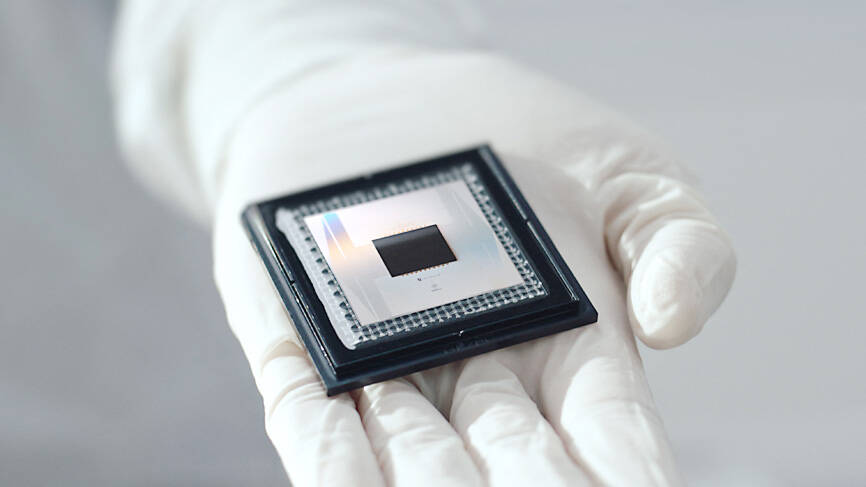Google on Monday showed off a new quantum computing chip that it said was a breakthrough that could bring practical quantum computing closer to reality.
A custom chip called “Willow” does in minutes what it would take leading supercomputers 10 septillion years to complete, Google Quantum AI (artificial intelligence) founder Hartmut Neven said.
“Written out, there is a 1 with 25 zeros,” Neven said of the time span while briefing journalists.

Photo: AFP via Google
“A mind-boggling number,” Neven added.
Neven’s team of about 300 people at Google is on a mission to build quantum computing capable of handling otherwise unsolvable problems like safe fusion power and stopping climate change.
“We see Willow as an important step in our journey to build a useful quantum computer with practical applications in areas like drug discovery, fusion energy, battery design and more,” Google CEO Sundar Pichai said on X.
A quantum computer that can tackle these challenges is still years away, but Willow marks a significant step in that direction, Google said.
While still in its early stages, scientists believe that superfast quantum computing would eventually be able to power innovation in a range of fields.
Quantum research is seen as a critical field and the US and China have been investing heavily in the area, while Washington has also placed restrictions on the export of the sensitive technology.
Private and public investment in the field has totaled about US$20 billion worldwide over the past five years, Olivier Ezratty, an independent expert in quantum technologies, said in October.
Regular computers function in binary fashion: They carry out tasks using tiny fragments of data known as bits that are only ever either expressed as 1 or 0.
However, fragments of data on a quantum computer, known as qubits, can be 1 and 0 at the same time — allowing them to crunch an enormous number of potential outcomes simultaneously.
Crucially, Google’s chip demonstrated the ability to reduce computational errors exponentially as it scales up — a feat that has eluded researchers for about 30 years.
The breakthrough in error correction, published in leading science journal Nature, showed that adding more qubits to the system reduced errors rather than increasing them — a fundamental requirement for building practical quantum computers.
Error correction is the “end game” in quantum computing and Google is “confidently progressing” along the path, Google quantum hardware director Julian Kelly said.

SEMICONDUCTOR SERVICES: A company executive said that Taiwanese firms must think about how to participate in global supply chains and lift their competitiveness Taiwan Semiconductor Manufacturing Co (TSMC, 台積電) yesterday said it expects to launch its first multifunctional service center in Pingtung County in the middle of 2027, in a bid to foster a resilient high-tech facility construction ecosystem. TSMC broached the idea of creating a center two or three years ago when it started building new manufacturing capacity in the US and Japan, the company said. The center, dubbed an “ecosystem park,” would assist local manufacturing facility construction partners to upgrade their capabilities and secure more deals from other global chipmakers such as Intel Corp, Micron Technology Inc and Infineon Technologies AG, TSMC said. It

NO BREAKTHROUGH? More substantial ‘deliverables,’ such as tariff reductions, would likely be saved for a meeting between Trump and Xi later this year, a trade expert said China launched two probes targeting the US semiconductor sector on Saturday ahead of talks between the two nations in Spain this week on trade, national security and the ownership of social media platform TikTok. China’s Ministry of Commerce announced an anti-dumping investigation into certain analog integrated circuits (ICs) imported from the US. The investigation is to target some commodity interface ICs and gate driver ICs, which are commonly made by US companies such as Texas Instruments Inc and ON Semiconductor Corp. The ministry also announced an anti-discrimination probe into US measures against China’s chip sector. US measures such as export curbs and tariffs

The US on Friday penalized two Chinese firms that acquired US chipmaking equipment for China’s top chipmaker, Semiconductor Manufacturing International Corp (SMIC, 中芯國際), including them among 32 entities that were added to the US Department of Commerce’s restricted trade list, a US government posting showed. Twenty-three of the 32 are in China. GMC Semiconductor Technology (Wuxi) Co (吉姆西半導體科技) and Jicun Semiconductor Technology (Shanghai) Co (吉存半導體科技) were placed on the list, formally known as the Entity List, for acquiring equipment for SMIC Northern Integrated Circuit Manufacturing (Beijing) Corp (中芯北方積體電路) and Semiconductor Manufacturing International (Beijing) Corp (中芯北京), the US Federal Register posting said. The

India’s ban of online money-based games could drive addicts to unregulated apps and offshore platforms that pose new financial and social risks, fantasy-sports gaming experts say. Indian Prime Minister Narendra Modi’s government banned real-money online games late last month, citing financial losses and addiction, leading to a shutdown of many apps offering paid fantasy cricket, rummy and poker games. “Many will move to offshore platforms, because of the addictive nature — they will find alternate means to get that dopamine hit,” said Viren Hemrajani, a Mumbai-based fantasy cricket analyst. “It [also] leads to fraud and scams, because everything is now